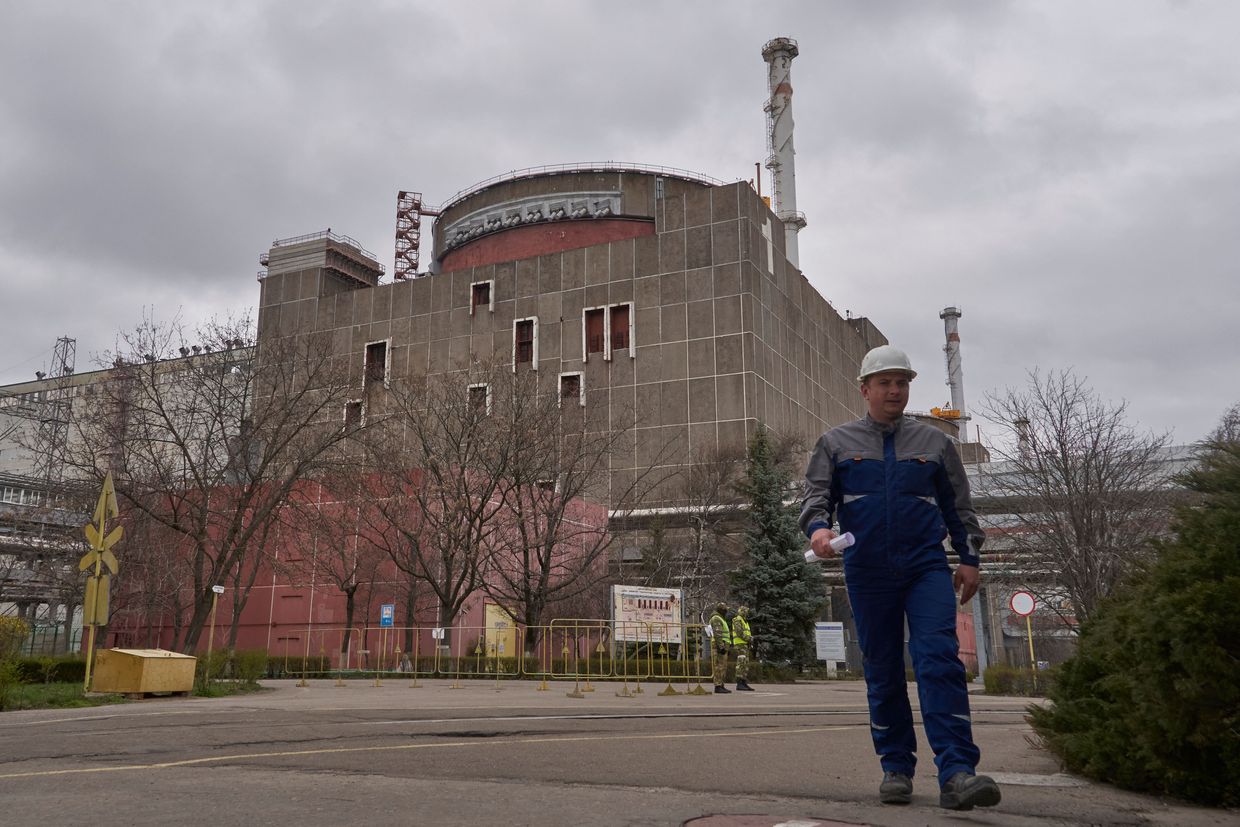Here is the October 15, 2024 edition our weekly Ukraine Business Roundup newsletter. Subscribe here to receive the latest news on business and technology from Ukraine in your inbox.
Ukraine is facing its toughest winter ever since the beginning of the invasion, as Russia looks to cut off its nuclear power. Already, half of its electricity generation sector has been destroyed in attacks.
Russia has not directly attacked nuclear plants with missiles or kamikaze drones, but is increasingly targeting nearby infrastructure such as substations that contain crucial equipment connecting nuclear plants to the grid.
What could this mean for Ukraine? If Ukraine can’t quickly repair and protect its nuclear assets, large-scale attacks on the infrastructure could cause a humanitarian disaster and freeze out Ukrainians.
According to Wojciech Jakabick, an energy analyst based in Warsaw, if Russian attacks succeed in disconnecting all power plants from the grid then Ukraine’s one stable power source will be gone.
“(Nuclear energy) is a baseload capability, which cannot be replaced by renewables or other sources and, especially, not by imported energy,” he told The Kyiv Independent.
“With a smaller nucleus capacity in place, Ukraine’s flexibility and ability to stabilize energy generation will be reduced.”
Due to Russian strikes, Ukraine has lost nine gigawatts in power generation this year, including eight thermal and five hydro plants.
“We live in a world with a deficit (of functioning infrastructure) in Ukraine. The Kyiv Independent quoted Tim Gould, Chief Economist of the International Energy Agency (IEA), as saying that this winter would be the most difficult yet.
You can read the full story by business reporter Dominic Culverwell here.
Russia is pursuing Ukraine’s grain exports again
In recent days, Russia has intensified its attacks on civilian ships and the port infrastructure surrounding Odesa. This is an apparent attempt by Russia to damage Ukraine’s exports.
Oleksii Kulba, Minister for the Development of Communities, Territories, and Infrastructure, said that the purpose of these attacks was to reduce our export capacity.
He said: “This is a deliberate effort to provoke a crisis in those parts around the world that depend directly on Ukrainian grain supplies.”
What was hit? Over the last week, Russia has launched six attacks in this area, killing 15 people and injuring more than 30.
The missile attacks have caused damage to civilian vessels including the Palau flagged Optima that was attacked earlier on October 7, and the Saint Kitts-and-Nevis flagged Paresa that was carrying 6,000 metric tonnes of corn for export.
Bridget Diakun is a maritime risk analyst with Lloyd’s List Intelligence. She told Dominic Culverwell, our business reporter, that it’s too early to tell if the attacks will have an impact on arrivals in Ukraine’s ports.
Ships traveling to and from the ports of the country in the Black Sea are aware that there are risks.
“From my conversations, I don’t think there is a lot of concern yet in the shipping industry even though they are aware that the situation has become more dangerous,” she said.
The next few days/weeks could have a major impact on the outcome.
Customs reform
Smuggling costs the country billions in lost customs duties each year, at a time when the state coffers are strained to fund Ukraine’s existence.
How much are we talking about? Smugglers can avoid paying customs fees by bribing or lying. They smuggle anything from cigarettes and iPhones, to perfume and food, across the border without declaring or labeling.
“Customs may be the biggest cash cow that brings corruption money into Ukraine’s system of politics.” It’s the biggest tax-evasion scheme that exists in the country,” said Josh Rudolph of the U.S. think tank German Marshall Fund.
The State Customs Service has been overhauled by the new comprehensive reform bill that was passed by the parliament in response to the increasing pressure from both the internal and external worlds on Ukraine to end corruption at the border.
The bill was presented to the president on September 23. It will become law after he signs the bill into law. However, it may take several years for the effects of the reforms to be reflected in the state budget.
Find out more about the reforms by clicking here.
Kherson bar finds a new life in Kyiv
Late in the summer of 2022 Yehor Lohvynovskyi, owner of Lunca Bar, and his team were walking in Kyiv. They spotted a courtyard that was empty. “We should open up a bar here!” said one of his coworkers half-jokingly.
They didn’t know that less than a month later, in February 2023, the joke would become a real business plan.
While liberated by Kremlin forces, the bar’s original location in the southern city of Kherson was constantly under Russian shelling. The bar was flooded by Russia after the Kahkovka Dam was destroyed in 2023.
The only way to keep the business open was to rebuild in Kyiv.
The Lunca Bar is located in the heart Kyiv. Its vibrant courtyard, off Yaroslaviv Val Street, fills up during the summer. The team recreated the cozy atmosphere from the Kherson location. Some of the original tables were used, and the walls were still decorated with artwork by local artists.
Click here to read the complete story.
Q&A with Foreign Defense Investors
Ukraine has become an innovation hotbed in defense technology, as Russia’s deadly incursion fuels rapid development of new battlefield techniques.
The country needs foreign investment to advance its innovation and become a leader in the global defense sector.
The government has launched a number of initiatives to encourage foreign investments, including Brave1, a program that acts as an accelerator. The Kyiv Independent reporter Andrea Januta met with two foreign investors that have been working with Brave1 as strategic partners to discuss the defense technology sector in Ukraine and ways to attract more investment.
The two are optimistic about the prospects of the country, despite lower levels than one might have hoped for in terms of foreign investment.
“I want to state on record that we believe in the next five year, the Ukrainian defence sector will attract a half billion dollars of venture capital,” Andre Pienaar said. He is the co-founder and CEO of investment firm C5 Capital.
The Kyiv independent: How would describe Ukraine’s defense sector as it is now? What has changed over time?
Michael Hewitt, a leading expert in the field of drone warfare, said that Ukraine has moved from a traditional defense sector to a new one focusing on asymmetric warfare and drone warfare, whether it be air, sea or subsea. We want to take this to the next level of venture capital, which is growth, scalability and following what President Zelensky wanted to do: build capacity in the defence industry. From artillery shells to building up the country’s defense capacity and being part of the European Defense Industry, we are looking to do everything from.
The Kyiv independent: BraveOne announced a few weeks ago that Ukraine’s defense technology industry had attracted private investments of $12 million since the start of the war. This number is higher than last year, but still low when compared to other nations. What do you believe is stopping investors?
Andre Pienaar : I believe there are two things we can do to scale up this capital in Ukraine. One is to provide as much mentoring as possible to founders about lessons learned, how to work with venture capital, and how to make mistakes. The government should do everything it can to remove restrictions on the exportation of Ukrainian intellectual property. This will allow Ukrainian founders to build companies that are truly global and can become unicorns.
You can read the entire interview here.
What else is happening?
After successful drone tests in Ukraine, US tech firm Anduril announces the sale of drones
Reuters reported that the U.S. defense technology company Anduril would begin selling small autonomous drones following successful testing in Ukraine. Anduril claims that their new drones are capable of flying up to 40 minutes, and can cover a distance of 20 kilometers (12miles). Anduril raised $1.5billion at the start of August, the largest ever announced round of funding for defense tech.
Ukraine’s Parliament approves a ‘historic’ tax increase
Verkhovna Rada (Ukraine’s parliament) passed a bill in second reading to increase taxes, for the first time, since the beginning of the full-scale war. The Verkhovna Rada is looking to raise money to meet its budget needs. The bill is unpopular with the business community, who feel it unfairly targets the taxpayers because the government fails to pursue illegal businesses that avoid paying taxes. The bill must still be signed by President Obama before it becomes law.
Ukraine sells its state-owned titanium manufacturer in a privatization auction to raise funds for the state coffers
The sale of UMCC Titanium, one of the world’s largest titanium producers, is one of the highest-profile privatizations since the iconic Hotel Ukraina was sold in Kyiv in a recent auction. It is also the first successful auction for a large industrial holding after many years. Cemin Ukraine, owned by the Azeri businessman Nasib Hazanov, who also owns Vodafone Ukraine’s second largest mobile operator, is a Neqsol Holding Company. The auction was part of the “Great Privatization Initiative” by the government to raise funds for wartime budget.
Reuters reports that the World Bank has approved a fund to facilitate G7’s $50 billion loan to Ukraine
Josh Lipsky, senior Director of the Atlantic Council’s GeoEconomics Center told Reuters that this amount of money was “a game-changing sum of money”. He was referring to both the combined effect of a new World Bank fund, and the announcement made the day before, in which the EU approved a 35 billion euro loan, as part of he G7 loan. Lipsky said that “real resources on the ground can make a real difference.”
Rome will host the next Ukraine Recovery Conference from July 10-11, 2020
The event is intended to mobilize support for Ukraine’s reconstruction and recovery efforts following the war. It follows previous conferences held in London in 202023 and Berlin 2024. “Looking to the future peace and prosperity means also looking at reconstruction. I am happy and proud to announce that the “Ukraine Recovery Conference” will be held in Rome from 10-11 July 2025,” Italian PM Giorgia Mello said on October 10 after meeting with President Volodymyr Zelensky.
Liliane is a business editor for the Kyiv Independent. She worked previously at the Kyiv Post, first as a business reporter and then as a business editor. Liliane has a master’s in Russian, Eastern European and Eurasian Affairs with a focus on Ukrainian Studies from Columbia University. She served as a Peace Corps volunteer in Ukraine from 2017-2020, and then interned at the Atlantic Council’s Eurasia Center.
Read More @ kyivindependent.com













